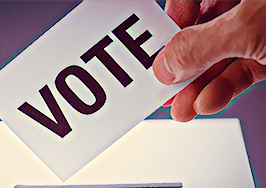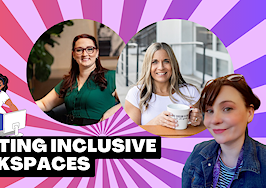In these times, double down — on your skills, on your knowledge, on you. Join us Aug. 8-10 at Inman Connect Las Vegas to lean into the shift and learn from the best. Get your ticket now for the best price.
National disability independence day is celebrated each year on July 26. This day commemorates the signing of the Americans with Disabilities Act (ADA) in 1990. Kicking off a new series, we will tackle common barriers that disabled individuals face in the workplace.
These topics will cover workplace practices, consumer issues and specific housing challenges that agents need to know about. In part two of the series, today’s video will cover what ableism is and how you can build awareness and education around this issue. (Find part one here: 26% of your office is touched by disability. Are you prepared?)
We are focused on building skills for today and tomorrow while creating agents of change. An estimated 26 percent of Americans have a disability recognized under the ADA, meaning that potentially one in four of your customers face some mental or physical barrier when navigating life.
As the housing industry moves into the future, there are many discussions about disrupting the norm. Our service team is dedicated to helping ensure that you have the tools you need to be innovative and provide the best service possible for agents and consumers.
Our experts
In this fantastic interview series, I connected with two amazing women who are making change in our industry in a big way. First and closest to our crew here at Inman, we have the pleasure of working with Dani Vanderboegh, a long-standing senior editor.
In addition to her duties as senior editor, Vanderboegh and her team produce niche newsletters for first-year agents, veteran agents, brokers and teams, and she writes Inman’s Real Tea column, where real estate and reality TV intersect.
Since earning her master’s degree in magazine editing from the University of Missouri School of Journalism in December 2014, she has happily been part of the team at Inman, collaborating with industry-leading professionals, working with top real estate journalists, and speaking at industry events nationwide including WomanUp.
Living in a semi-rural suburb of St. Louis with her husband and daughter, she explores her passions for gardening, reading and writing, nerding out over all things pop culture, exploring new gastronomic frontiers, and sharing her life as a wheelchair user in hopes of creating awareness.
Second, we were joined by Alycia Anderson of The Alycia Anderson Company. Anderson is an international speaker and advocate for Diversity, Equity and Inclusion training.
A celebrated TEDx speaker and advocate, Anderson is a vibrant and brilliant woman who has created more education around Disabling Ableism. Anderson is a wealth of knowledge and personal experiences to help businesses train better employees and offer more inclusive experiences for consumers.
Anderson also recently launched a new podcast called Pushing Forward with Alycia, where she gives disability a voice, challenges stereotypes, and promotes inclusivity.
What is ableism?
Ableism describes any prejudice, bias and discrimination directed toward people living with disabilities. Ableism includes many different aspects, some of which may be confusing to those who have good intentions but terrible execution:
- Assuming that people with disabilities want to be “healed” or can “overcome” a disability
- Suggesting they’re “inspirational” for handling everyday activities and routine tasks
- Assuming they lead an unhappy, limited life
- Assuming they can’t do things for themselves
- Using words like “normal” and “healthy” to describe non-disabled people
- Asking intrusive questions about someone’s disability, like “What happened?”
- Touching someone, or any equipment or devices they use, without permission
- Ignoring requests for accommodations or refusing to acknowledge someone’s disability
- Being ignorant or unaware of challenges because those challenges do not have a direct impact
- Making cruel or insensitive comments because the speaker thinks people with disabilities are less-than; implying that people with disabilities will not understand those comments
What can we do to fix this?
Education, awareness and the willingness to change are all essential. A great place to start is just learning about these issues and making it a goal to comply with basic accessibility. Also, it wouldn’t hurt to research appropriate etiquette and work on your behaviors from an invasive and unplanned reaction to a well-planned and respectful interaction.
The Fair Housing Act (FHA) and the Americans with Disabilities Act (ADA) are in place to ensure individuals with disabilities have equal access to home-buying opportunities. While these laws are in place, it takes much more than guidelines to improve experiences for the disabled in our country. It’s more than just an accessibility crisis; we also have deficient skill sets for social and emotional interactions.
Check out our previous article on improving workplace inclusivity and consumer best practices to start revamping your current business plan to fight ableism.
Wrapping up
On April 5, 1977, what is known in history as the 504 “Sit In” took place to finally make lawmakers accountable for building more equity into policy for the disabled in America.
It took 28 days and countless volunteers to force lawmakers and the American public to look hard at life experiences when you are not able-bodied.
Just 46 years in the past, it seems just a heartbeat away from where we are today as our population faces more mental health challenges, more aging and physical challenges. We have to face the reality that the present and the future call for change and more awareness around disabilities.
Be thoughtful, be prepared and, more importantly, understand boundaries. We are a service-built industry, but we must ensure that service is equitable for all.
Rachael Hite is a former agent, a business development specialist, fair housing advocate, copy editor, and is currently perfecting her long game selling homes in a retirement community in Northern Virginia. You can connect with her about life, marketing, and business on Instagram.

























